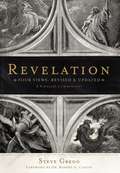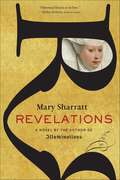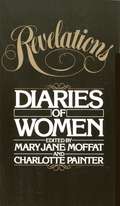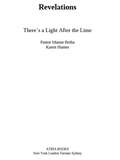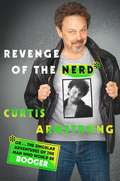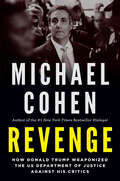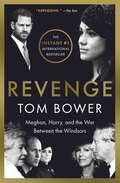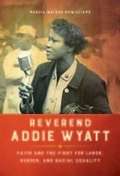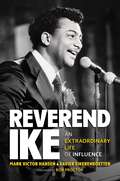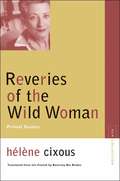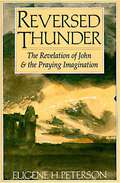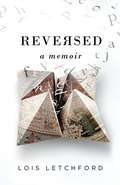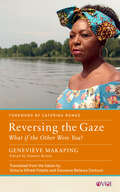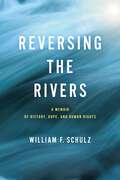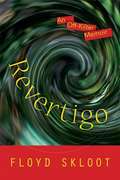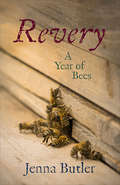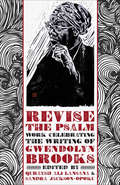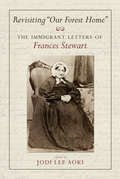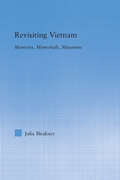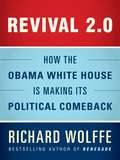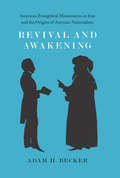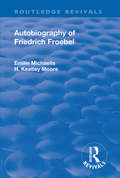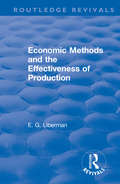- Table View
- List View
Revelation: Four Views, Revised and Updated
by Steve GreggHow can we understand the book of Revelation and its many interpretations? Four Views of Revelation: A Parallel Commentary covers the traditional views in an even-handed fashion. Four parallel columns present the information you need on these key views, and inform you about outstanding commentators on the book of Revelation. No other book gives such extensive coverage of how the church has understood Revelation over the centuries. The four-column format makes this an easy read for lay people, pastors, and scholars alike. This is a wonderful addition to any Bible study resource library. Features include:Convenient, one-volume formatFour parallel columns for easy comparisonComplete coverage of the major interpretations of RevelationExtensive coverage of the place of Revelation in church history
Revelations
by Mary SharrattA fifteenth-century Eat, Pray, Love, Revelations illuminates the intersecting lives of two female mystics who changed history—Margery Kempe and Julian of Norwich. Bishop&’s Lynn, England, 1413. At the age of forty, Margery Kempe has nearly died giving birth to her fourteenth child. Fearing that another pregnancy might kill her, she makes a vow of celibacy, but she can&’t trust her husband to keep his end of the bargain. Desperate for counsel, she visits the famous anchoress Dame Julian of Norwich. Pouring out her heart, Margery confesses that she has been haunted by visceral religious visions. Julian then offers up a confession of her own: she has written a secret, radical book about her own visions, Revelations of Divine Love. Nearing the end of her life and fearing Church authorities, Julian entrusts her precious book to Margery, who sets off the adventure of a lifetime to secretly spread Julian's words. Mary Sharratt vividly brings the medieval past to life as Margery blazes her trail across Europe and the Near East, finding her unique spiritual path and vocation. It's not in a cloistered cell like Julian, but in the full bustle of worldly existence with all its wonders and perils.
Revelations: Diaries of Women
by Mary Jane Moffat Charlotte PainterExcerpts from the private diaries of women, known and unknown, among them Louisa May Alcott, Sophie Tolstoy, George Eliot, Anais Nin.
Revelations: There's a Light after the Lime
by Mason BethaImagine having it all and leaving it all behind -- to answer a higher calling... REVELATIONS His rise to fame was one of rap's great success stories. He had millions of fans and the prospect of multi-millions of dollars. But just as Mase -- as he was then called -- was poised to sign a deal with Sean "Puffy" Combs' famed Bad Boy Records, he walked away. Revelations is Mason Betha's powerful memoir about a miraculous transformation: his own -- from the material-minded Mase to the pastor he has become. Here, Betha reveals the rhyme and reason behind his choice to trade in his sensational music career for a richer, more spiritual one. As founder of a nondenominational movement called S.A.N.E. (Saving a Nation Endangered) Ministries, Betha has traveled throughout the country to share his messages of peace and prosperity with today's youth. Revelations is his testament to the enduring power of faith, and to the limitless possibilities in a life transformed by God's guiding hand.
Revenge of the Nerd: Or . . . The Singular Adventures of the Man Who Would Be Booger
by Curtis ArmstrongRisky Business. Revenge of the Nerds. Better Off Dead. Moonlighting. Supernatural. American Dad. New Girl. What do all of these movies and television shows have in common?Curtis Armstrong.A legendary comedic second banana to a litany of major stars, Curtis is forever cemented in the public imagination as Booger from Revenge of the Nerds. A classically trained actor, Curtis began his incredible 40-year career on stage but progressed rapidly to film and television. He was typecast early and it proved to be the best thing that could have happened. But there’s more to Curtis’ story than that. Born and bred a nerd, he spent his early years between Detroit, a city so nerdy that the word was coined there in 1951, and, improbably, Geneva, Switzerland. His adolescence and early adulthood was spent primarily between the covers of a book and indulging his nerdy obsessions. It was only when he found his true calling, as an actor and unintentional nerd icon, that he found true happiness. With whip-smart, self-effacing humor, Armstrong takes us on a most unlikely journey—one nerd’s hilarious, often touching rise to the middle. He started his life as an outcast and matured into…well, an older, slightly paunchier, hopefully wiser outcast.In Hollywood, as in life, that counts as winning the game.
Revenge: How Donald Trump Weaponized the US Department of Justice Against His Critics
by Michael CohenThe man the New York State Attorney General credited with inspiring her prosecution of Donald Trump — New York Times number one bestselling author Michael Cohen — tells the behind-the-scenes story of what can happen to you — and what really happened to him — when a President who believes himself to be above the law decides to go after his critics . . . .When Michael Cohen's secret payoff to porn star Stormy Daniels on behalf of Donald Trump made Cohen look like a liability to the by-then-President of the United States, the end to their decade-long relationship came swiftly — with a knock on the door from the FBI. Soon, Cohen would find himself imprisoned — even though he had plenty of evidence to show he was innocent of most of the charges.Meanwhile, with the release of the Steele Dossier, Cohen also found himself battling endless news reports citing the Dossier's claims that he'd had clandestine dealings with Russia — reports that only mounted despite his exoneration by the Mueller Report.In a story now being echoed in recent breaking news stories about IRS persecution of other Trump foes such as former FBI head James Comey and others, Cohen details — in his inimitable blunt language, with absolutely no holds barred and naming names — his attempt to clear his name and tell the truth about Donald Trump. Chillingly, he also makes clear what happens when you try to speak truth to power, and the power knows no bounds.
Revenge: Meghan, Harry, and the War Between the Windsors
by Tom BowerThis instant #1 internationally bestselling &“explosive tell-all&” (Daily Express, London) reveals the inside story about Meghan Markle&’s journey from minor actress and attempted activist to the woman powerful enough to drive a wedge within the British Royal Family.After a childhood spent on Hollywood film sets, Meghan Markle fought hard for stardom. But even when she landed her breakthrough role on Suits, her dream of worldwide celebrity remained elusive until she met the man who would change her life—Prince Harry. Their whirlwind romance culminated with Meghan&’s ultimate fairy tale ending: their 2018 wedding at Windsor Castle. Finally, the world was her stage. It seemed that the dizzying success of the wedding between the new Duke and Duchess of Sussex marked the beginning of a fresh era for the British Royal Family. Yet, within one tumultuous year, the dream became a nightmare. In the aftermath of the infamous Megxit split and their Oprah Winfrey interview, the increasingly toxic relationship between the two Windsor sides seemed forever ruptured. What does the future hold for Meghan and Harry? And can the rest of the Windsors restore their reputation? Now, with extensive research and exclusive insider interviews, Britain&’s leading investigative biographer unravels the tangled web of courtroom drama, courtier politics, and thwarted childhood dreams to reveal this &“bombshell&” (The Mirror, London) story of love, betrayal, secrets, deceit, and revenge.
Reverberations: The Memoirs of Dietrich Fischer-dieskau
by Dietrich Fischer-DieskauThe memoirs of Dietrich Fischer-Dieskau, a great opera and Lieder singer. He shares his penetrating insights into music, his painstaking preparations for the roles he has made his own, his acute assessments of his famous contemporaries, and how he has dealt with stunning public triumph and overwhelming personal tragedy. Born 1925, died 2012, his recordings of Schubert, Schumann and Hugo Wolf songs are still widely available today.
Reverend Addie Wyatt: Faith and the Fight for Labor, Gender, and Racial Equality (Women, Gender, and Sexuality in American History)
by Marcia Walker-McwilliamsLabor leader, civil rights activist, outspoken feminist, African American clergywoman--Reverend Addie Wyatt stood at the confluence of many rivers of change in twentieth century America. The first female president of a local chapter of the United Packinghouse Workers of America, Wyatt worked alongside Martin Luther King Jr. and Eleanor Roosevelt and appeared as one of Time magazine's Women of the Year in 1975. Marcia Walker-McWilliams tells the incredible story of Addie Wyatt and her times. What began for Wyatt as a journey to overcome poverty became a lifetime commitment to social justice and the collective struggle against economic, racial, and gender inequalities. Walker-McWilliams illuminates how Wyatt's own experiences with hardship and many forms of discrimination drove her work as an activist and leader. A parallel journey led her to develop an abiding spiritual faith, one that denied defeatism by refusing to accept such circumstances as immutable social forces.
Reverend Ike: An Extraordinary Life of Influence
by Mark Victor Hansen Xavier EikerenkoetterThe unlikely and sometimes harrowing journey of an iconic evangelist, known to millions as simply Reverend Ike, will draw you into his remarkable story of rising from extreme poverty and leading millions of poor Blacks to unprecedented financial success, independence, and joyful living by understanding the profound Biblical promises of prosperity.Lovingly known by his ardent and enthusiastic followers as Reverend Ike, Frederick J. Eikerenkoetter II touched millions of lives. He presented people with a new way to think about themselves, about life, and about all the riches of health, happiness, joy, love, success, prosperity, and money that could be theirs—if they only understood the principles that he had come to understand. These were the very transformational principles he taught to the hungry hearts, souls, and minds who showed up at his church meetings, workshops, and radio or TV broadcasts each week. Ike&’s early life was full of family drama, opposition, and extreme poverty. Still, he refused to follow the prevailing belief—even within his own family and community—that Black people were here to suffer. Rev. Ike embodied his work and his purpose to raise others up to a better life. In truth, he was a perfect example of the power of faith in action. He overcame the odds by rising above obscurity and transforming himself to a place of great significance. Around the world, individuals were touched in countless ways and lifted out of poverty, anger, hopelessness, and depression. As Ike&’s ministry grew, his calling captured the attention and devotion of millions. Compared frequently to the internationally revered Reverend Billy Graham, Reverend Ike became one of the most widely known and heard inspirational prosperity teachers of his generation.
Reveries of the Wild Woman
by Hélène Cixous Beverley Bie BrahicBorn to an Algerian-French father and a German mother, both Jews, Hélène Cixous experienced a childhood fraught with racial and gender crises. In this moving story she recounts how small domestic events - a new dog, the gift of a bicycle - reverberate decades later with social and psychological meaning. The story's protagonist, whose life resembles that of the author, endures a double alienation: from Algerians because she is French and from the French because she is Jewish. The isolation and exclusion Cixous and her family feel, especially under the Vichy government and during the Algerian War of independence, underpin this heartbreaking but also warmly human and often funny story. The author-narrator concedes that memories of Algeria awaken in her longings for the sights, sounds, and smells of her home country and ponders how that stormy relationship has influenced her life and thought. A meditation on postcolonial identity and gender, Reveries of the Wild Woman is also a poignant recollection of how childhood is author to the woman.
Reversed Thunder: The Revelation of John and the Praying Imagination
by Eugene H. PetersonPeterson's eloquent meditation on the Revelation of St. John engages the imagination and awakens the intellect to the vitality and relevance of the last words on scripture, Christ, church, worship, evil, prayer, witness, politics, judgment, salvation, and heaven.
Reversed: A Memoir
by Lois LetchfordIn 1995, the school diagnostician called a seven-year-old, “The worst child seen in 20 years of teaching.” Can a child’s fate be sealed by such a diagnosis? Well, in 2018, that boy received a Ph.D. from Oxford University. <P> Do you have a child struggling with reading? What labels has your child been given? How do you feel they will progress through school? This is a story for you. <P> Every parent has high hopes for their children. When Lois Letchford learns her son has been diagnosed with a low IQ at the end of grade one, she refuses to give up on his future. After thorough testing, Nicholas proves to have no spatial awareness, limited concentration, and can only read ten words. Although discouraged, Lois knows things have to improve. After all, her son is young, and every child learns at their own pace. But once Nicholas is labeled "learning disabled," a designation considered more derogatory than "dyslexia," the world of education is quick to cast him aside. <P> Determined to prove them all wrong, Lois temporarily removes her son from the school system and begins working with him one-on-one. She has no formal reading education herself, and no one to guide her. But she has hope and the strength of will to persevere. And sometimes that's all you need. What happens next is a journey—spanning three continents, unique teaching experiments, never-ending battles with the school system, a mother’s discovery of her own learning blocks, and a bond fueled by the desire to rid Nicholas of the “disabled” label. <P> "Reversed" is a memoir of profound determination that follows the highs and lows of overcoming impossible odds, turning one woman into a passionate teacher for children who have been left behind. Nothing is impossible when one digs deep, and looks at students through a new lens.
Reversing the Gaze: What if the Other Were You? (Other Voices of Italy)
by Geneviève MakapingTired of being scrutinized, criticized, and fetishized for her black skin, Cameroon-born scholar Geneviève Makaping turns the tables on Italy’s white majority, regarding them through the same unsparing gaze to which minorities have traditionally been subjected. As she candidly recounts her experiences—first across Africa and then as a migrant Black woman in Italy—Makaping describes acts of racist aggression that are wearying and degrading to encounter on a daily basis. She also offers her perspective on how various forms of inequality based on race, color, gender, and class feed off each other. Reversing the Gaze invites readers to confront the question of racism through the retelling of everyday occurrences that we might have experienced as victims, perpetrators, or witnesses.
Reversing the Rivers: A Memoir of History, Hope, and Human Rights (Pennsylvania Studies in Human Rights)
by William F. SchulzFrom 1994 to 2006, William F. Schulz headed Amnesty International USA. During this time, he and the organization confronted some of the greatest challenges to human rights, including genocides in Rwanda, Bosnia, and Sudan; controversies over the prison camp at Guantanamo Bay, Cuba, and the use of torture by the United States after 9/11; as well as growing concern about inequities in the American justice system, from police misconduct to the death penalty. Drawing upon his encounters with tyrants, the inspiration of brave human rights heroes, and collaborations with celebrities ranging from Patrick Stewart to Salma Hayek, Schulz uses poignant narrative and amusing anecdotes to discuss the day-to-day realities of struggling with life-and-death human rights crises. In the process he ducks an assassination threat in Liberia; brings tears to the eyes of the Prime Minister of Northern Ireland; and bests America’s self-described “toughest sheriff” on Bill Maher’s Politically Incorrect.Full of reflection as well as action, Reversing the Rivers provides Schulz with the opportunity to address profound philosophical questions, such as “What is the nature of evil?”; “How do we foster the ‘better angels of our nature’?” “When may we use force to stop people from using force?” “Is the prohibition on torture as simple as it seems?” and “What’s wrong with an eye for an eye?” Most important, in an eloquent concluding chapter, he answers the quandary most frequently posed to him during his years at Amnesty, “Given all the horrors in the world you see day after day, how do you retain any hope at all in humanity?”
Revertigo
by Floyd SklootOne March morning, writer Floyd Skloot was inexplicably struck by an attack of unrelenting vertigo that ended 138 days later as suddenly as it had begun. With body and world askew, everything familiar had transformed. Nothing was ever still. Revertigo is Skloot’s account of that unceasingly vertiginous period, told in an inspired and appropriately off-kilter form. This intimate memoir#151;tenuous, shifting, sometimes humorous#151;demonstrates Skloot’s considerable literary skill honed as an award-winning essayist, memoirist, novelist, and poet. His recollections of a strange, spinning world prompt further musings on the forces of uncertainty, change, and displacement that have shaped him from childhood to late middle age, repeatedly knocking him awry, realigning his hopes and plans, even his perceptions. From the volatile forces of his mercurial, shape-shifting early years to his obsession with reading, acting, and writing, from the attack of vertigo to a trio of postvertigo (but nevertheless dizzying) journeys to Spain and England, and even to a place known only in his mother’s unhinged fantasies, Skloot makes sense of a life’s phantasmagoric unpredictability.
Revery: A Year of Bees
by Jenna ButlerI hope you're okay in there, lovelies. I hope you're warm. After five years of working with bees on her farm in northern Alberta, Jenna Butler shares with the reader the rich experience of keeping hives. Starting with a rare bright day in late November as the bees are settling in for winter she takes us through a year in beekeeping on her small piece of the boreal forest. Weaving together her personal story with the practical aspects of running a farm, she takes us into the worlds of honeybees and wild bees. She considers the twinned development of the canola and honey industries in Alberta and the impact of crop sprays, debates the impact of introduced flowers versus native flowers, the effect of colony collapse disorder, and the protection of natural environments for wild bees. This is also the story of women and bees, and how beekeeping became Jenna Butler's personal survival story.
Revise the Psalm: Work Celebrating the Writing of Gwendolyn Brooks
by Sandra Jackson-Opoku Quraysh Ali Lansana"In the hands of Gwendolyn Brooks, old age is a diamond with many facets. Throughout her poetry Brooks has illuminated old age as a time of isolation and withdrawal, remembrance and continuity, poverty, vulnerability, even homelessness, exploitation, neglect, abandonment, marginalization and destruction. And, yet, she offered resistance and affirmation."-Angela Jackson, award-winning poet and activistThe year 2017 marks the 100th birthday of the late poet and cultural icon Gwendolyn Brooks. Miss Brooks' depictions of poor and working class African Americans provides insight into the civil rights movement of the 1960s, and her lens on the Great Migration, hard and necessary truths about race injustice, and the Black Power movement interprets and contextualizes current racial inequities and tensions. This collection of poetry, essays, and art inspired by the work of Miss Brooks celebrates her life, writing, and activism.Quraysh Ali Lansana is author or editor of twenty books. He is a faculty member of the Writing Program of the School of the Art Institute of Chicago. Lansana served as Director of the Gwendolyn Brooks Center for Black Literature and Creative Writing at Chicago State University from 2002 to 2011.Sandra Jackson-Opoku has authored two novels. The River Where Blood is Born earned the American Library Association Black Caucus Award for Best Fiction. Hot Johnny (and the Women Whom Loved Him) was an Essence magazine bestseller. Her fiction, poetry, articles, essays, and scripts have appeared the Los Angeles Times, Ms. magazine, the Literary Traveler, Islands Magazine, and elsewhere.
Revisiting "Our Forest Home": The Immigrant Letters of Frances Stewart
by Jodi Lee AokiFrances Stewart arrived in Upper Canada from Ireland in 1822 with her husband, three children, and two servants. The family settled in Douro Township on the bank of the Otonabee River in 1823. Spanning three-quarters of a century, her letters represent the immigrant experience of one of the first pioneer women in the Peterborough, Ontario, area. Included are transcripts of the extant collection. They chronicle the three stages of Francess life: the years of her childhood in Ireland to her departure for North America; her voyage across the Atlantic and her life in Upper Canada to the time of her husbands death in 1847; and the period of widowhood until her death in 1872. The chapter summaries, annotations, and key passages extracted from letters written by others further the story of Francess nineteenth-century immigrant life. Advance Praise for Revisiting Our Forest Home Presenting the perspective of a cultivated immigrant who refrained from publication, Frances Stewarts articulate letters to her family and friends nicely complement the narratives of her Peterborough neighbours, Susanna Moodie and Catharine Parr Traill. Jodi Aokis intelligent approach to the editorial complexities of the Stewart archive has given us a reliable and welcome volume that makes an important contribution to our understanding of womens lives on the Upper-Canadian frontier. Carole Gerson, University Professor, English Department, Simon Fraser University Revisiting Our Forest Home is a welcome addition to the scholarly record of nineteenth-century writing and letters by immigrant gentlewomen to Upper Canada. To have this well-edited and thoughtful record of Stewarts struggles available is a boon to scholars, old and new. With precision and tenderness, Jodi Aoki brings forward these important and culturally revealing letters. In her hands, the original Our Forest Home, initially a project meant only for family members, becomes a valuable and much fuller record of social and family life in early Ontario. Michael Peterman, Professor Emeritus, Trent University, FRSC
Revisiting Vietnam: Memoirs, Memorials, Museums (Literary Criticism and Cultural Theory)
by Julia BleakneyThis book explores the memorializing practices of American veterans of the Vietnam War at several of the most significant contemporary sites of memory in the United States and Vietnam. These sites include veterans' memoirs, museum exhibits, replicas of the National Vietnam Veterans Memorial, and tourism to Vietnam. Because war memorializing has, since the late 1960s, shifted focus from national soul searching to personal identity and recovery, I emphasize how contemporary narratives of the war, shaped more by memory than by history, often are detached from the specific history of the war and its political controversies. Drawing on trauma and cultural memory scholarship, as well as empirical data gathered during field research in the U.S. and Vietnam, the author examines how veterans' memorializing practices have become increasingly individualized, commodified, and conservative since the early 1980s.
Revival 2.0: How the Obama White House Is Making Its Political Comeback
by Richard WolffeRevival 2.0 tells the dramatic inside story of how President Obama and his team have regained their footing and learned to fight for their political survival.Bestselling Obama biographer Richard Wolffe (author of Renegade and Revival) follows President Barack Obama and his inner circle (including Valerie Jarrett, David Plouffe, Hillary Clinton, David Axelrod, and Robert Gibbs), from the Democratic defeat in the 2010 midterm election through their suprising resurgence over the last six months. Drawing on key sources within the West Wing, Revival 2.0 reveals:· The story behind the personnel shake-ups and reorganization of the administration--from the departure of Rahm Emanuel and Robert Gibbs to the arrival of new figures the likes of Bill Daley and Jay Carney.· How the White House effectively pushed through their agenda (including the START treaty and repeal of "don't ask, don't tell") with a lame-duck Congress, and positioned itself well in dealing with the new Republican-controlled House over the looming budget battles and a defense of their health care plan.· The internal debate between Survivalists and Revivalists over the response to the revolutions in Tunisia, Egypt, and Libya.· The campaign strategy for the 2012 election as told directly by Obama's top campaign team--David Axelrod and David Plouffe in particular.· Key insights into the killing of Osama bin Laden, how it's the crowning achievement of Obama's political turnaround, and solidifies his stature as commander-in-chief in the war on terror.An up-to-minute guide on how an administration attempts to navigate dangerous political waters, Revival 2.0 is a must-read to understanding how Obama has grown into his role as a president and has found a way to lead effectively.
Revival and Awakening: American Evangelical Missionaries in Iran and the Origins of Assyrian Nationalism
by Adam H. BeckerMost Americans have little understanding of the relationship between religion and nationalism in the Middle East. They assume that the two are rooted fundamentally in regional history, not in the history of contact with the broader world. However, as Adam H. Becker shows in this book, Americans--through their missionaries--had a strong hand in the development of a national and modern religious identity among one of the Middle East's most intriguing (and little-known) groups: the modern Assyrians. Detailing the history of the Assyrian Christian minority and the powerful influence American missionaries had on them, he unveils the underlying connection between modern global contact and the retrieval of an ancient identity. American evangelicals arrived in Iran in the 1830s. Becker examines how these missionaries, working with the "Nestorian" Church of the East--an Aramaic-speaking Christian community in the borderlands between Qajar Iran and the Ottoman Empire--catalyzed, over the span of sixty years, a new national identity. Instructed at missionary schools in both Protestant piety and Western science, this indigenous group eventually used its newfound scriptural and archaeological knowledge to link itself to the history of the ancient Assyrians, which in time led to demands for national autonomy. Exploring the unintended results of this American attempt to reform the Orient, Becker paints a larger picture of religion, nationalism, and ethnic identity in the modern era.
Revival: Autobiography of Friedrich Froebel (Routledge Revivals)
by Friedrich FroebelOriginally published in 1915, the Autobiography of Fredrich Froebel provides a detailed overview of the life of the eminent German educator Fredrich Froebel, it charts his life and looks at his significant contribution to the field of education, including his Idealist philosophy of early childhood education, and his establishment of the kindergarten, a school for four-and five-year-old children that is found worldwide. The book also looks at the community surrounding Froebel and includes a chapter by Madame Louise Froebel’s providing a reminiscence of her husband’s life.
Revival: Economic Methods And The Effectiveness Of Production (1971) (Routledge Revivals)
by E G Liberman Arlo SchultzThis title was first published in 1971: Aims to provide an exciting and psychologically penetrating account of the life of Russia's 18th century tsar/reformer and the theme of progress through violence in Russia.
Reviving Aleppo: Urban, Legal and Digital Approaches for Post-War Recovery (Cities, Heritage and Transformation)
by Fabian Thiel Rahaf OrabiThis book provides indispensable and interdisciplinary insights into the revitalization and redevelopment of urban centers in war-stricken conflict regions, such as Aleppo in northern Syria. This contribution explores innovative, cutting-edge toolkits for academicians, digital building technologists, engineers, architects, archeologists, (urban) planners, land policy advisors and legal scholars. The compendium not only analyzes strategies and shortcomings of implementation guidelines drawn by donor organizations, development agencies and political actors, but also explores possibilities for initiating functioning and sustainably resilient networks that can establish capacity-building platforms for recovery and reconstruction. Although the work focuses on a city in Syria, it holds lessons, toolkits and instruments for other areas in the region and beyond.
